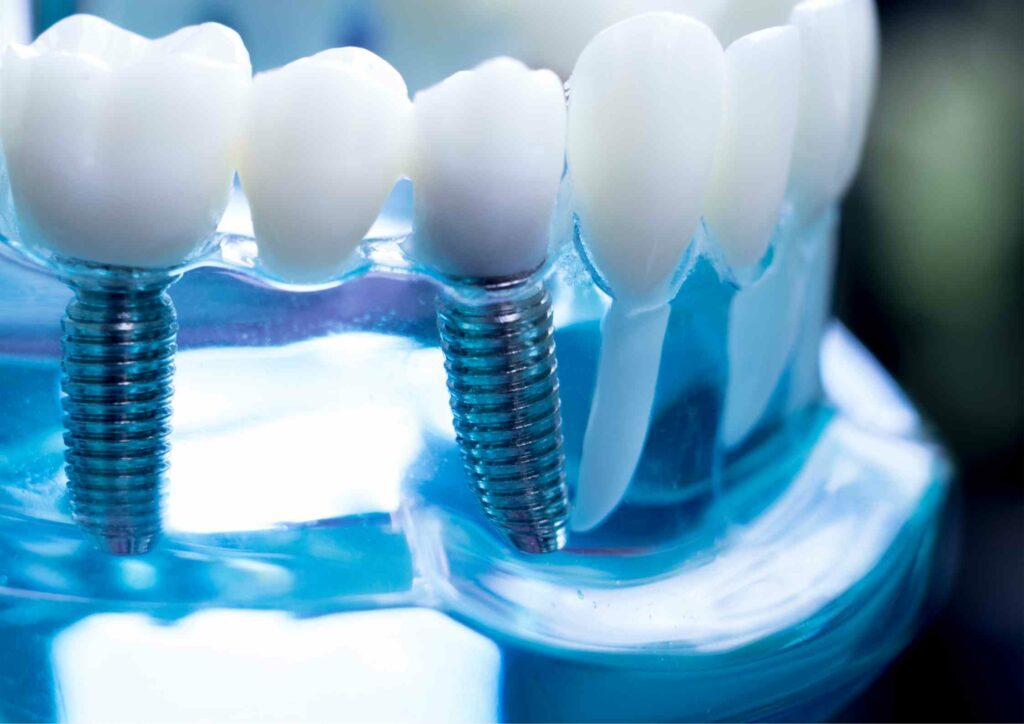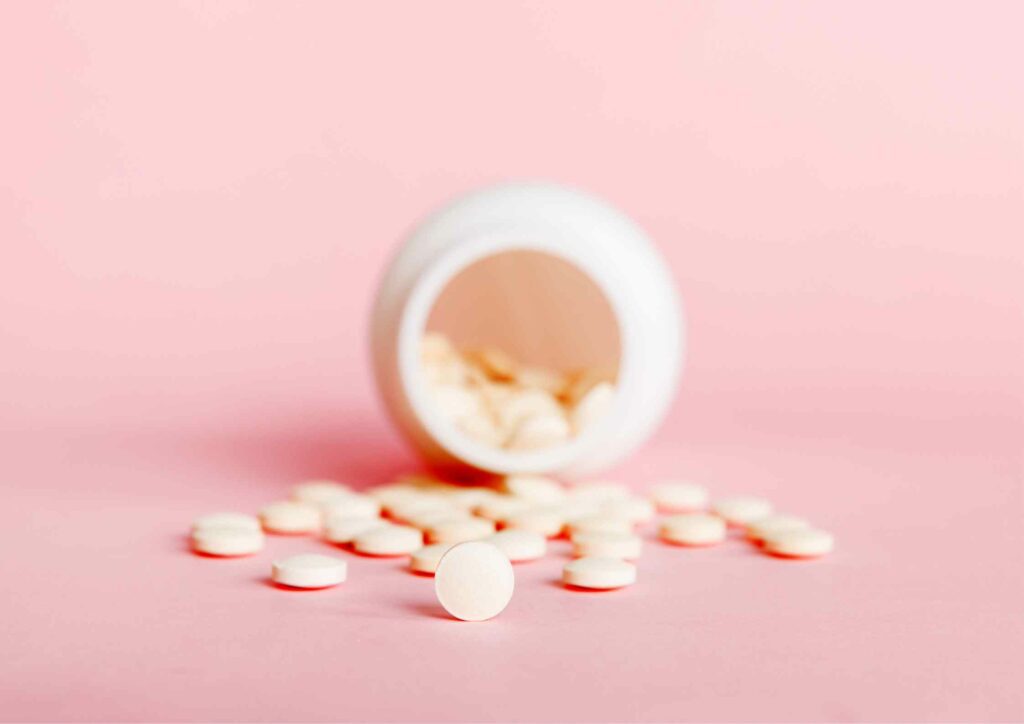Experiencing pain after receiving dental implants is a common occurrence that can be effectively managed with the right strategy. Dental implants, although an excellent solution for missing teeth, can cause discomfort as your body adjusts to the new fixture.
We will walk you through several steps to alleviate pain and ensure a smooth recovery process.
Dental Implants: Solution to Missing Teeth
Dental implants are often the preferred choice for individuals seeking to rectify the issue of missing teeth. Essentially, they function as artificial roots for teeth, providing a robust foundation for fixed or removable replacement teeth. Beyond restoring a brilliant smile, dental implants offer numerous advantages:
Improved Aesthetics: Dental implants are designed to mimic the appearance and feel of your natural teeth, integrating flawlessly into your mouth.
Increased Functionality: With dental implants, the days of struggling with loose dentures are over. They enable you to eat and speak with renewed confidence.
Boosted Oral Health: Dental implants are a better option than tooth-supported bridges because they do not require the reduction of other teeth. As a result, more of your natural teeth are preserved, improving your long-term oral health.

However, it’s important to note that, like all good things, dental implants come with a caveat. They necessitate a surgical procedure, which, predictably, may lead to some post-operative pain and discomfort. Fear not, though! This guide is here to provide you with strategies to alleviate any pain following dental implant surgery and expedite your recovery process.
In the following sections, we will discuss the expected duration of discomfort and provide useful tips to mitigate it.
How Long Does Pain Last After Dental Implants?
The length of pain after dental implant surgery varies based on individual health and procedure complexity. Typically, it’s normal to experience some level of discomfort and swelling in the first 48 to 72 hours after the surgery. This is your body’s natural response to the surgical intervention.
However, with the help of prescribed pain management medications and by following your oral surgeon’s recovery protocol, this discomfort should steadily decrease over this time.
While most patients report that the majority of their discomfort has dissipated within a week to ten days, complete healing of the area can take several weeks to a few months.
What Affects the Duration and Intensity of Pain?
There are several factors that can influence the duration and intensity of pain following dental implant surgery:
Individual Pain Tolerance: Everyone has a unique pain threshold. Some patients may experience more discomfort than others, even with similar procedures, due to their individual pain sensitivity.
Complexity of the Procedure: More complex procedures, such as those that involve bone grafting or sinus lifts, may result in a more extended recovery period and potentially more discomfort.
Oral Health Status: Patients with good oral health typically recover faster. In contrast, those with oral health issues, such as gum disease, might experience a longer healing process.
Post-Operative Care: How well you follow your dentist’s post-operative care instructions can significantly influence your recovery. This includes taking prescribed medications, maintaining oral hygiene, and avoiding certain foods and activities.
Overall Health Status: Your general health can play a critical role in your recovery. Patients with certain chronic conditions, like diabetes, or those who smoke may experience delayed healing.
Remember, it’s crucial to communicate with your dental surgeon about any perceived abnormalities in your pain or recovery process. Timely intervention can prevent complications and ensure a smoother healing experience.
Relief of Dental Implant Pain Using Medication
The management of dental implant pain largely involves the use of various medications. These can be grouped into prescription and over-the-counter (OTC) drugs.
Prescription Medications
Your dentist may prescribe stronger pain relievers, such as opioids, for managing severe pain immediately after the procedure. These drugs are highly effective but should be used sparingly and under your dentist’s supervision due to the risk of addiction.

Opioids: Traditionally used for managing severe pain following dental procedures. While they are highly effective, caution should be exercised due to their potential for addiction.
Tramadol: Offers relief without the typical side effects associated with opioids. Although it’s still classified as an opioid, it works differently, making it a suitable alternative for patients at risk for opioid addiction.
Gabapentin: Originally developed as an anti-seizure medication, Gabapentin has found a role in pain management. Its unique mechanism of action can help alleviate pain, particularly nerve pain, a common complaint after dental implant procedures.
Warning: Proper and responsible use of medications is crucial for pain management after dental implant procedures. Follow your dentist’s instructions for dosage and frequency, and promptly report any concerns or side effects. Avoid self-medication, over-reliance, and sharing prescribed medications. Remember, medication is a part of a comprehensive recovery and healing approach, not a long-term solution.
Over-the-counter (OTC) Medications
In the case of mild to moderate dental implant pain, over-the-counter medications may be sufficient for pain relief. These include:
- Ibuprofen (Advil, Motrin): An NSAID (nonsteroidal anti-inflammatory drug) that can reduce inflammation and pain.
- Acetaminophen (Tylenol): A medication that relieves pain and reduces fever.
- Naproxen (Aleve): Also an NSAID, it can relieve pain and reduce inflammation.
It’s important to adhere to the dosage instructions provided by your dentist or the medication manufacturer to avoid possible side effects. Additionally, communicate with your dental surgeon about any allergies or existing medical conditions that can influence the choice of pain relief medication.
Disclaimer: Information provided in this article is for educational purposes only. Always consult with your dentist or a healthcare professional before starting any medication.
How to Relieve Pain from Dental Implants with Home Remedies
While over-the-counter medications can alleviate pain associated with dental implants, home remedies may also significantly help. Here are a few suggestions:
Cold Compresses: Applying a cold pack to the affected area can reduce swelling and numb pain. Wrap the ice pack in a cloth and place it on the cheek near the implant.
Saltwater Rinse: Saltwater is a natural disinfectant. Rinsing your mouth with warm salt water can help keep your mouth clean and reduce discomfort.
Soft Foods: Consuming soft foods can minimize irritation at the implant site. Foods like mashed potatoes, yogurt, and smoothies are good options in the days following the procedure.
Rest and Hydration: Proper rest and staying hydrated can enhance your body’s healing ability, reducing pain and discomfort.
We’ll list some traditional remedies that can also be used to reduce pain and inflammation. However, it is always important to check with your dentist regarding the safety of using such remedies.
Clove Oil:
Clove oil is recognized for its pain-relieving properties, particularly in dentistry. Eugenol, a key compound in clove oil, can temporarily relieve toothache or discomfort from dental implants. Apply clove oil to the implant site using a soaked cotton ball. Be careful not to overuse clove oil, as it may cause irritation or a burning sensation.
Chamomile Tea:

Chamomile tea can help reduce stress and promote restful sleep, aiding in healing with its calming effects. Additionally, chamomile has anti-inflammatory properties that could potentially help with pain and swelling. You can safely enjoy chamomile tea multiple times a day. Remember to let it cool before drinking to avoid discomfort near the implant.
Honey:
Honey, especially raw honey, can potentially alleviate discomfort related to dental implants. It possesses antimicrobial and anti-inflammatory properties, aiding in fighting off infections and reducing swelling. Its soothing effect contributes to pain relief.
It is recommended to add a teaspoon of honey to warm tea or water and consume it multiple times a day. However, avoid direct application of honey to the surgical site to prevent harm to surrounding teeth.
Turmeric:
Turmeric, a staple in many kitchens, also has potential benefits for dental health. It contains curcumin, a compound known for its anti-inflammatory, antiseptic, and antioxidant properties. These characteristics can assist in speeding up the healing process, reducing swelling, and preventing infection post-implant surgery.
To make a turmeric rinse, dissolve half a teaspoon of turmeric powder in a cup of warm water. Use the mix to rinse your mouth a couple of times a day.
Garlic:
Garlic is another effective home remedy that can benefit dental implant patients. Its strong antimicrobial properties can help prevent bacterial infections that could hinder healing. Moreover, garlic contains allicin, which has pain-relieving and anti-inflammatory properties, making it useful in managing discomfort and swelling.

While fresh garlic is the most potent, it might be too harsh to be applied directly to the surgical site. Adding crushed garlic to soups or other meals can help promote healing after dental implant surgery.
While home remedies offer many benefits, including convenience, affordability, and generally fewer side effects, it’s important to consider their limitations. Unlike prescribed or over-the-counter medication, home remedies may not work as quickly or powerfully. While these remedies can be excellent supporting aids, they should never replace professional medical advice or treatment.
How to Relieve Pain from Dental Implants with Lifestyle Changes
Adopting a healthier lifestyle can significantly help alleviate discomfort and expedite the healing process following dental implant surgery.
Eating Soft Foods:
One of the most straightforward lifestyle changes post-implant surgery is adjusting your diet to include soft foods. This helps minimize pressure on the surgical site, leading to less inflammation and discomfort.
Consuming nutrient-rich soft foods such as mashed potatoes, smoothies, scrambled eggs, and soup can give your body the essential nutrients to heal while ensuring minimal discomfort and strain on your new implants.
Avoid hot foods and drinks for a few days after your surgery, as they can increase blood flow and lead to further swelling.
Staying Hydrated:
Proper hydration is essential for recovery after dental implant surgery. Staying hydrated by drinking plenty of water flushes out toxins and promotes healing. Remember to avoid swishing water aggressively around the mouth to prevent disruption at the surgical site.
After surgery, it’s best to refrain from using straws for a minimum of one week since the sucking motion can interfere with the healing process. Remember to stay clear of alcoholic, caffeinated, or overly sugary beverages as they may lead to dehydration, potentially slowing down recovery.
Prioritizing Good Sleep:
Getting enough restful sleep is crucial for a speedy recovery after dental implant surgery. Aim for 7-9 hours of quality sleep per night and establish a regular sleep routine. Avoid electronic devices before bedtime and consider using aids like eye masks or earplugs for a sleep-friendly environment.

Remember, a well-rested body can recover more effectively, reducing the risk of complications.
Managing Stress:
Effective stress management is crucial for a successful recovery after dental implant surgery. You can support your body’s natural healing process by taking steps to relax and reduce tension, such as practicing mindfulness, engaging in regular exercise (with doctor’s approval), and spending time in nature.
Remember, a calm mind contributes to a healthier body, so prioritize stress management techniques in your recovery routine.
Habits to Hold Off On:
Certain habits can hinder the healing process after dental implant surgery. It’s crucial to avoid these to ensure a smooth recovery:
- smoking or using tobacco products
- excessive alcohol consumption
- Physical exertion (heavy lifting and strenuous exercise)
- Extreme temperatures
- Hard/sticky foods
The path toward embracing lifestyle modifications can be a mixture of rewarding victories and testing challenges. The rewards manifest in improved comfort and potentially expedited recovery, yet they require strong commitment and unwavering discipline.
The crowning glory, though, is that these practices not only augment your oral health but considerably enhance your overall well-being, enriching the quality of your life.
Guiding Your Journey to a Comfortable Smile
Dental implants offer a remarkable solution for tooth loss, seamlessly merging aesthetic appeal with practical functionality. However, the journey may involve some post-operative discomfort, which this guide aims to help you manage effectively. Our primary goal is to equip you with practical strategies to alleviate pain and promote a swift recovery.

Experiencing discomfort post-operatively is a standard, albeit temporary, phase of the healing process. You possess a robust toolkit to tackle this – medication, home remedies, and lifestyle modifications. When these strategies are applied together, they can significantly enhance the comfort of your recovery journey.
However, it’s important to remember the timeless advice: “When in doubt, reach out!” Adhere to the post-operative instructions offered by your dental care provider. If discomfort seems unusual or persists longer than expected, don’t hesitate to sync up with your dentist or oral surgeon. They are your guiding light towards a brighter, pain-free smile.





















